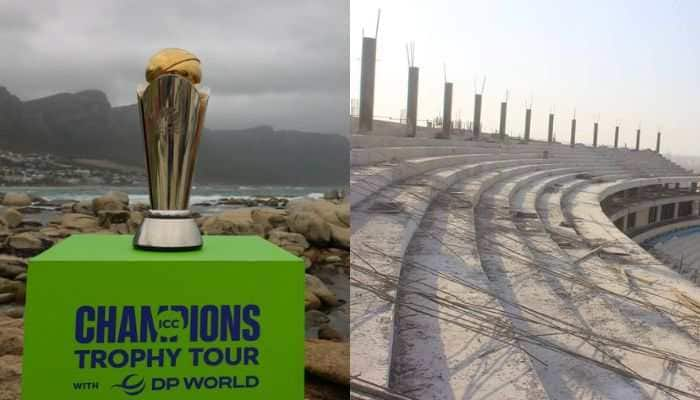Pakistan establishing diplomatic missions in African countries amid rising radical Islamic terrorism in Africa
Multiple national, regional, and international peacekeeping and anti-terrorism forces are also operating at cross-cutting levels across the African continent.
- The instability in Africa is going to impact the whole world including India.
- The rise of radical Islamic terrorism in the continent will result in New Delhi to reconfigure its positions on issues related to Africa at the global fora.
Trending Photos
) File Photo
File Photo Pakistan, a country that is known for being the epicentre of international terrorism is now involved in establishing diplomatic relations and setting up its diplomatic missions in the African countries amid rising radical Islamic terrorism in the continent.
As per the Indian security officials who are aware of the developments, Pakistan has been establishing its diplomatic relations and missions in the African continent at an accelerated pace since 2019.
The officials stated that this factor, when seen with Pakistan's association with radical Islamic terror groups, can be a cause of concern for India and by covertly supporting the terror groups and overtly strengthening diplomatic relations with these countries, Pakistan can place itself in a powerful position.issues
The instability in Africa is going to impact the whole world and the rise of radical Islamic terrorism in the continent will result in New Delhi having to reconfigure its positions on Africa-related issues.
India has been contributing to the United Nations (UN) peacekeeping missions in African countries for a long time and has also either set-up or run military academies in countries like Ethiopia, Nigeria, and Ghana.
With an increase in the number of terror-related activities in these African regions, India’s role in counter-terrorism building capacity in Africa will grow further.
The objective of most of these radical Islamic outfits is to establish Islamic regimes across the world. India might become a centre of the transaction of workforce and resources for these outfits.
In countries going through sheer anarchy and growing terrorism, like Somalia and those located in the Sahel region, it is very likely that the terrorist outfits might gain a significant amount of control on governance — if not neutralized.
These countries might become similar to Afghanistan of the 1990s, ruled by the Taliban.
Notably, the terrorists are also fighting within themselves in Africa and are indulged in a war due to inter-organization revelries and shifting loyalties.
The Islamic State (IS) spread its wings in most parts of Africa by ensuring the defection of terrorists and outfits affiliated to Al-Qaeda (AQ) to its side. In some cases, split groups from AQ affiliates moved to form IS affiliates, despite a large part of their outfits remaining aligned to the AQ.
In the Sahel region, Jamaat Nusrat al-Islam wal-Muslimin (JNIM) and Islamic State in Greater Sahara (ISGS), the affiliates of AQ and IS, are currently indulged in a fight.
In most of the cases, JNIM has detained ISGS's supporters and cut off its fuel supply as well.
The IS and AQ are also indulged in a conflict in Somalia. Numerous instances of violent clashes have surfaced in the recent past and both the outfits have “declared war” against each other.
In Egypt, violent clashes have taken place between AQ affiliated Jund al-Islam and IS-affiliated Wilayat Sinai groups.
In the Lake Chad basin, IS and Boko Haram are getting increasingly indulged into a conflict. New differences are also emerging within the IS, with IS central branch and its new branches taking opposite sides. It reflects that besides numerous inter-organisational rivalries, there are also intra-organisation rivalries between terrorists in Africa.
The root cause of the conflict between AQ and IS lies in differences between AQ leaders Laden and Zawahiri with Iraqi AQ leader Abu Musab al-Zarqawi, who created the AQ-Iraq branch. The outfit later evolved to become ISIL, ISIS, and later the IS.
The AQ focused on fighting the far off enemy including the Western nations, whereas, Zarqawi wanted to fight the near army to purify religion and establish a Sunni regime. Both the groups question the Jihadi nature of each other and accuse each other of being ‘less Jihadi’.
The routes of expansion of terrorist networks in Africa:
It is noteworthy that radical Jihadi violence is expanding throughout Africa and spreading to countries which are not overwhelmingly Muslim dominated.
The DRC, Kenya, and Uganda account for 10%, 11%, and 14% of the Muslim population, while, Chad and Nigeria respectively have 58% and 50% of Muslim population.
All these countries have become new breeding grounds for terrorists. Moreover, terror groups are most active in these countries in areas which have a concentrated Muslim population.
There are three major roots formal inroads of terrorism in the African continent.
Firstly, terrorism is progressing downwards towards the southern parts of Africa from North Africa (Maghreb), following a horizontal path.
Secondly, there has also been a vertical expansion of terrorism as the geographical focus on terrorism in the Sahel has also been moving towards the coastal West African states.
Thirdly, the Arabian peninsula has made the Horn of Africa region and Somalia contagious with terrorism.
Besides, one of the major reasons for the growth of terrorism has been the loss of battlegrounds of the IS by the hands of security forces. As the IS lost ground in the Middle East, it moved its resources to Africa and started working to build and strengthen its structure in the continent.
Abu Bakr al-Baghdadi announced in 2016 that the IS had “expanded and shifted some of its command, media, and wealth to Africa.
Countries like Ghana, Ivory Coast, and Togo are also increasingly getting concerned about radical Jihadi activities. Even a country like South Africa is concerned by the spread of terrorism in its neighborhood and is planning to deploy South African Defense Forces to assist Mozambican forces.
Military and diplomatic formations combating terrorism in Africa.
Multiple national, regional, and international peacekeeping and anti-terrorism forces are operating at cross-cutting levels across the African continent, operating parallel in some cases and complementary in others.
National military forces of nation-states are taking on radical Islamic outfits all across the continent. They also work in alliance with a number of regional and international forces.
The most prominent body engaged in a war with the militants is the African Union (AU). The AU runs its largest Peacekeeping Operation (PKO) in Somalia against the IS and Al Shabaab.
The AU has also constituted the African Union Multinational Joint Task Force against Boko Haram, with a 10,000 strong force in the Sahel region.
Burkina Faso, Chad, Mali, Mauritania and Niger have come together to constitute the G5 Sahel Group, which came up with its Joint Force in 2017 to fight against Islamic radicals in the region.
ECOWAS summit on terrorism, creating the Accra Initiative on intelligence-sharing on activities of the terrorist organisations moving to the coast. There are discussions on the formation of the G5 Gulf of Guinea Group to work together on counterterrorism.
Stay informed on all the latest news, real-time breaking news updates, and follow all the important headlines in india news and world News on Zee News.
Live Tv







)
)
)
)
)
)
)
)
)
)
